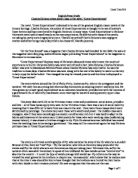A person’s class background dictated their life. Money and wealth was valued and dominated life. Yet Dickens portrays his characters to show the startling between the lives of different classes. His depiction of Joe as a man of the working class is in direct contrast with the “gentleman” characters such as Compeyson and Drummle. Joe is portrayed as a wholesome, hardworking man lacking in material wealth but in possession of a kind heart, Drummle is portrayed as gentleman who are cold, cruel and completely without morals who “either beats or cringes”. Dickens “rewards” his characters for their behaviour with what he believes they deserve. Joe was able to lead a comfortable and happy life with Biddy while Compeyson and Drummle met violent ends. This characterisation shows the startling differences in the moral fibre of the different classes, and discredits a popular attitude at the time that upper-class people were more gentile and moral.
The class barriers of Victorian England were supposed to be hard to penetrate, but Dickens uses irony to question that attitude. Estella is shown as an upper-class lady, yet the ending of the book reveals that she has come from the lowest of the low as the daughter of Magwitch and Molly. This ironic situation shows that although class was highly valued, a member of the lower classes by birth can still be passed off as a lady with the right conditions.
Justice was another important value of society of that era. Due to the industrialisation and the spreading gap between rich and poor, crime became a major feature of society and so justice was important, however, the justice system was arbitrary, repressive and lacked any real justice. Corruption was rife, as shown by Dickens when Pip first arrives in London and was approached by “a drunken minister of justice (prison gate keeper) to view a trial…for half a crown”. The description of London both before and after this line paints a bleak picture and appeals to the sensory perceptions of a reader, arousing feelings of doubt in such a bleak justice system. Corruption is also shown through Jaggers, who uses underhand methods and fabricates evidence for his clients. Jaggers go through a ritual of compulsive hand washing. This has a biblical resonance to the hand washing of Pontius Pilate before the crucifixion of Jesus, as well as alluding to Lady Macbeth’s hand washing to rid herself of guilt. This action of Jaggers symbolises that although he undertakes unethical practice, he feels guilt and responsibility and attempts to rid himself of those feelings because he values justice; he just has no choice but to defend his clients. Through the symbolism and descriptions, Dickens not only proves that justice was highly valued in that society, but also shows the unfairness of the justice system.
Victorian England was a patriarchal society where women were valued for their beauty, domestic abilities and little else. Dickens portrays this fact through his characterisation of Estella, Miss Havisham, Mrs. Joe and Biddy. Estella and Biddy are held as perfect examples of a woman in that time, while Miss Havisham and Mrs. Joe contradict that fact. Estella is beautiful and well educated, and once in London, becomes highly sought after by the gentlemen, while Biddy typifies a country woman, wholesome, hardworking and domestic. Yet it is Miss Havisham and Mrs. Joe that contradict the values of women in that society. Miss Havisham is bitter and vengeful, training Estella to break the hearts of men to seek revenge for her sufferings. She “took a child’s heart and put ice in its place”. In a society where women are controlled by men in all aspects of their lives, this independence is extremely unusual. Dickens portrays Miss Havisham as an evil fairy godmother figure; “she was the strangest lady I have seen…dressed in rich materials…her hair was white. Contradictory to the Victorian ideals and values of women; she is independent and coldhearted. Another conflicting character is Mrs. Joe. She is characterised as dominant and overbearing and at times violent towards Pip and Joe. Both of these characters meet unpleasant ends. Mrs. Joe dies after being violently attacked and Miss Havisham dies after attempting to incinerate herself. The eventual outcomes seem to be reflective of their behaviour; almost deserving such punishment because of what they did in their lifetimes. These two characters can be held as examples to show what should happen to women who go against the values of society, and thus reaffirming those values.
Through his characterisation, use of irony and comprehensive descriptions, Dickens has used “Great Expectations” to reflect the values and attitudes of nineteenth century English society towards the treatment of women, the importance of class backgrounds and the legal justice system.







